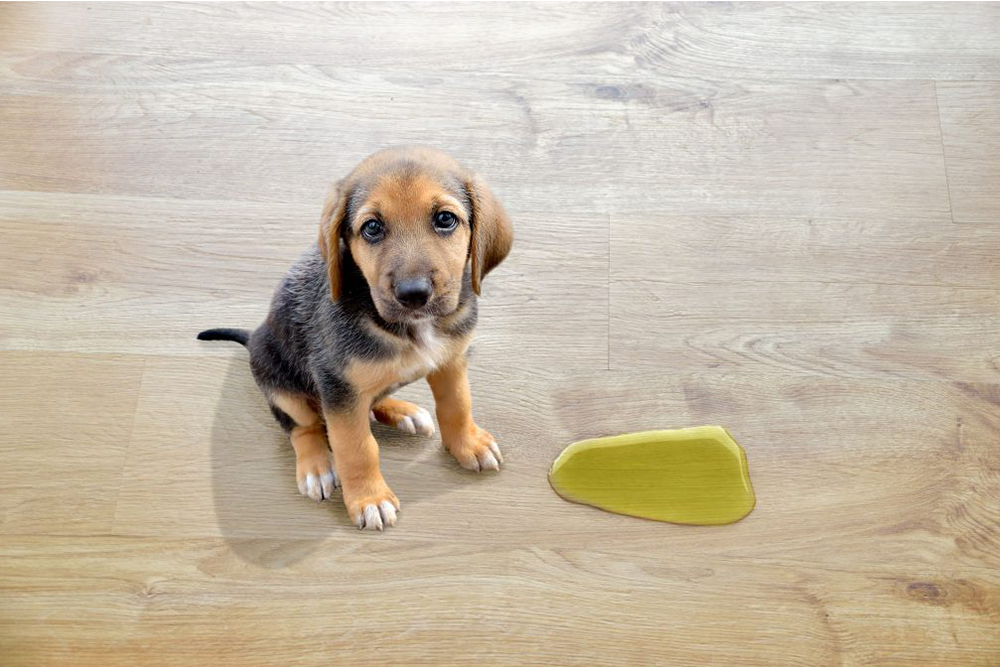Have you ever caught your furry friend relieving themselves on the floor, despite being perfectly trained and having access to their designated potty area? It’s a scenario that often leaves owners bewildered and wondering, “Is my dog peeing on the floor out of spite?” While attributing such behavior to malice might seem intuitive, it’s essential to delve deeper into the complex world of canine communication to understand the real reasons behind this frustrating act.

Image: www.istockphoto.com
Dogs, unlike humans, don’t harbor grudges or engage in acts of revenge. Their actions are driven by primal instincts and a need to communicate their needs and emotions. Understanding their body language, behavioral patterns, and underlying motivations is crucial to addressing this issue effectively.
The Myth of Canine Spite
The idea of a dog intentionally peeing on the floor out of spite is a common misconception. While it’s tempting to anthropomorphize our pets, it’s vital to recognize that their actions are rooted in instinct rather than malice.
Dogs don’t possess the cognitive capacity to understand abstract concepts like spite or revenge. Their behavior, even when it seems deliberate and seemingly targeted at their owners, is usually a manifestation of a deeper issue, such as:
1. Medical Issues:
- Urinary tract infections (UTIs): UTIs can cause frequent urination, accidents, and even blood in the urine. If your dog is suddenly experiencing accidents, a trip to the vet is essential to rule out this possibility.
- Kidney disease: Chronic kidney disease can impair the kidneys’ ability to filter waste, leading to increased urination and accidents.
- Prostate problems: In male dogs, an enlarged prostate can put pressure on the bladder, causing incontinence.
- Hormonal imbalances: Hormonal fluctuations, especially in older dogs, can affect bladder control.
2. Behavioral Issues:
- Anxiety: Separation anxiety, generalized anxiety, or anxiety triggered by specific events like thunderstorms can lead to inappropriate urination.
- Stress: Changes in routine, a new pet or baby in the house, or even a move can trigger stress and lead to accidents.
- Lack of training: If your dog hasn’t been properly housetrained, accidents are bound to happen.
- Marking behavior: Dogs, especially males, may engage in territorial marking by urinating in strategic locations to communicate their presence or dominance.

Image: tcah.info
Decoding the Canine Signal: Understanding Your Dog’s Body Language
While it’s unlikely that your dog is peeing on the floor out of spite, it’s crucial to understand the underlying reasons behind their behavior. Look for clues in your dog’s body language to gain insights into their emotions and motivations:
- Hiding: If your dog seeks a secluded spot to urinate, it might be due to fear or anxiety.
- Cowering: Cowering behavior, trembling, and tucked tail usually indicate fear or stress.
- Submissive postures: Rolling over to expose their belly, licking their lips excessively, and lowering their head are all signs of submissiveness.
- Aggression: Excessive barking, growling, and showing teeth might point towards aggression, which could be a response to fear or insecurity.
Taking Action: Addressing the Root Cause
Once you’ve ruled out medical reasons, it’s time to address the behavioral aspects of your dog’s urination issue. Here are some steps you can take:
1. Provide a Consistent Routine:
Dogs thrive on consistency. A predictable schedule for feeding, potty breaks, play, and even bedtime helps reduce anxiety and stress.
2. Create a Safe and Secure Space:
Ensure your dog has a safe and comfortable space where they feel safe and secure. This could be a designated crate, a cozy bed, or a quiet corner away from any potential stressors.
3. Address Anxiety:
If anxiety is the culprit, there are several strategies you can employ:
- Desensitization and counterconditioning: Gradually expose your dog to the triggers of their anxiety in a controlled environment, pairing them with positive experiences and treats to create positive associations.
- Medication: Consult your veterinarian about calming medications that can help manage severe anxiety.
- Anxiety-reducing products: Consider using calming supplements, pheromone diffusers, or pressure vests to help reduce anxiety levels.
4. Reinforce Positive Behavior
Positive reinforcement is key to housetraining and managing behavioral issues. Use treats and praise to reward your dog for using their designated potty area and for good behavior.
5. Seek Professional Help
If you’ve tried all the above strategies and your dog is still having accidents, don’t hesitate to consult a certified professional dog trainer or a veterinarian specializing in behavioral issues. They can provide personalized guidance and create a tailored plan to address your dog’s unique situation.
Dog Peeing On Floor Out Of Spite
Beyond the Floor: A Holistic Approach to Canine Understanding
Remember, accidents are often a sign of a deeper concern, and understanding your dog’s communication is key to addressing the issue effectively. Instead of attributing their actions to spite, view them as a call for help. By addressing the root cause of your dog’s behavior, you can foster a happier, healthier, and more trusting relationship.
Attributing inappropriate urination to spite is not only inaccurate but also detrimental to your relationship with your furry friend. It creates a misunderstanding and can lead to frustration and resentment. Instead, embrace a compassionate approach, focusing on understanding your dog’s needs and providing them with the support they need. By doing so, you can navigate these challenges and create a happier and more harmonious bond with your canine companion.
The key takeaway is that while frustrating, dog accidents are rarely an act of spite. They are a way for your dog to communicate distress, discomfort, or a lack of understanding. By understanding the reasons behind the behavior, you can provide the necessary support and create a loving and understanding environment for your loyal companion.






